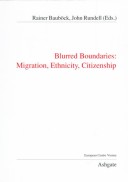Public Policy and Social Welfare
1 total work
The underlying themes of this book are forms of cultural diversity which result from migration and globalization. Historically, most liberal democracies have developed on the basis of national cultures, either a single one, a dominant one, or a federation of several. However, political and economic developments have upset traditional patterns and have blurred established boundaries. Ongoing immigration from diverse origins has inserted ethnic minorities into formerly homogeneous populations. The resulting pattern of multiculturalism is different from earlier ones. Often cultural boundaries are neither clearly defined nor do they simply dissolve by assimilation into a dominant group, they have become fuzzy and a constant source of real or imagined hostility and anxiety. A proliferation of mixed identities goes together with stronger claims for cultural rights and escalating conflicts between ethnic minorities and national majorities. In many countries multiculturalism is today perceived as a challenge rather than as an enrichment. The book focuses on the question of how institutions and policies of liberal democracies can cope with these trends.
